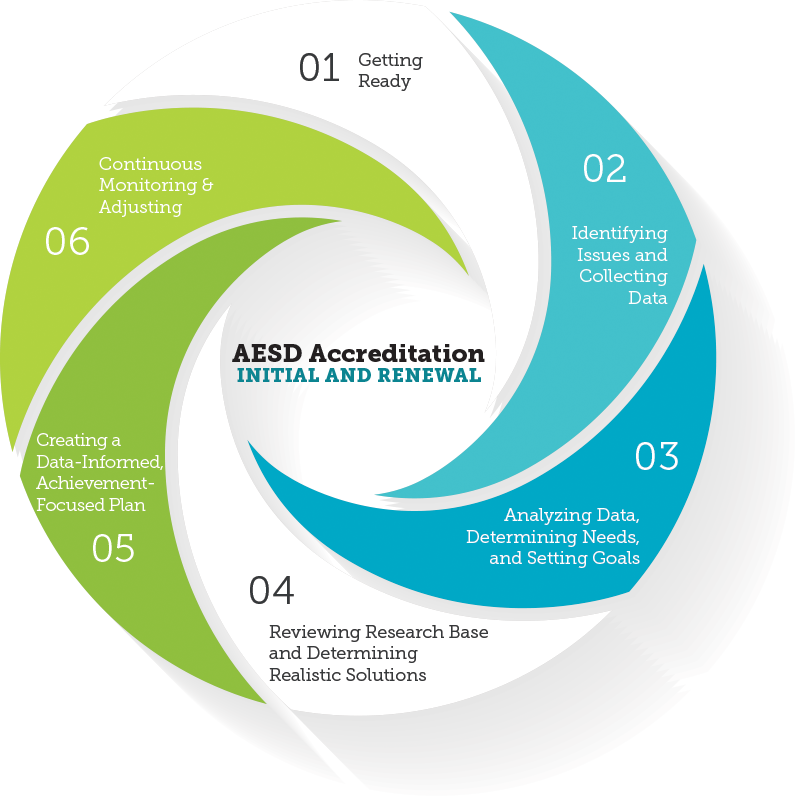About Accreditation
To date, more than 300 schools throughout the state – comprehensive, alternative, online, private, specialized high schools – have successfully completed or renewed their six-year accreditation through the AESD Accreditation process upon confirmation by a panel of volunteer ESD Board members.
Accreditation is granted for a period of six years, conditioned on a third-year review to check on continued progress towards the school’s goals, celebrate successes, and recalibrate as needed.
Our Purpose
Washington State school accreditation is a collaborative, research-based approach to school improvement designed to ensure that the state’s high schools are meeting high quality standards.
Through this process, schools can achieve a recognized six-year accreditation that is aligned to the State-required School Improvement Planning process and complementary to the school’s ongoing improvement efforts.
The AESD Accreditation self-study process provides for internal self-review and reflection by the school community as well as external review and validation of the school improvement plan, providing an important statement of accountability to your public.
The process aligns accreditation requirements to the continuous improvement of student learning, achievement, and growth using a Cycle of Inquiry to focus improvement planning and action.
Process: A Cycle of Inquiry, Action, and Improvement

Getting Ready
Preparing for the six-part accreditation process. Getting ready ensures that the people involved in the accreditation process know and understand the process, how they authentically engage in that process, and how data and research drive their instructional and systemic decisions in service to student achievement. As a starting point, school teams are provided reflection questions to evaluate their capacity to be successful through the accreditation process. It is assumed that the school’s vision, mission, and beliefs serve as a foundation for SIP planning.
Identifying Issues and Collecting Data
This stage describes the school, its unique qualities and operational procedures. Data helps “tell the story” of the school. The school team collects and reviews a wide variety of data from multiple sources to support and inform the plan for improvement. Types of data may include: student achievement, demographic, perception, contextual, and trend/patterns. Annual assessment data and any relevant on-going classroom formative assessment information are utilized.
Analyzing Data, Determining Needs, and Setting Goals
This stage organizes data in a way that helps discover vital information to improve student achievement. Data is integrated and analyzed from a systems perspective to search for deeper understanding and to determine potential relationships.
Reviewing Research Base and Determining Realistic Solutions
This stage begins with formation of a committee(s) to conduct or review research of best practices for each goal. The committee(s) will list relevant resources reviewed and highlight major findings to then be shared with staff, students, parents, and community stakeholders. The stakeholders will then review and respond to findings, culminating in draft solutions.
Creating a Data-Informed and Achievement-Focused Plan
The school team reviews and discusses relevant research related to the identified goals, then drafts a broad outline of sequential steps to accomplish the specific goal which is then shared with all stakeholders. A final draft of the plan will be created using input from stakeholders.
Continuous Monitoring and Adjusting
The school team develops a system of formative and summative assessments with a general timeline. Appropriate stakeholders monitor ongoing data and make recommendations for possible plan adjustments. Summative data and plan adjustments will be shared with stakeholders.
School Improvement Plan Process Review Tool
The AESD Accreditation online workspace is a foundational piece of this process. School teams have a dedicated, secure area online to work through the six phases of the School Improvement Plan Process Review (SIPPR) tool and attach their evidence/artifacts for each of the phases. The SIPPR tool was created specifically for AESD Accreditation and is embedded into the user-friendly online platform.
For questions, please contact us at accreditation@waesd.org or by calling 360-299-4022.
Foundational Requirements
Data-Informed
The School Improvement Plan (SIP) is based on and informed by data
Student-Achievement Focused
The SIP has the measurable achievement of all students as the primary end-goal
Research-Based Foundation and Actions
The SIP is built on a set of evidence-based elements of successful schools; the actions selected to meet goals within the plan are based on research
Collaboratively-Determined
The SIP is created with active involvement from all stakeholders who will be impacted by the plan
Accredited Schools Directory
Use the filters below to search for AESD Accredited schools and districts in Washington State. “Year Accredited” indicates the first year of accredited status following the school’s full initial or renewal process. Accreditation is provided for a period of six years conditioned on a satisfactory third-year review.
If you have any questions about your search result, contact us at 360-299-4022 or accreditation@waesd.org.
| School Name or Program | School District, Online, or Private School | Educational Service District | Year Accredited |
|---|---|---|---|
| Aberdeen (J.M. Weatherwax) High School | Aberdeen | ESD 113 - Tumwater | 2025/26 |
| Academy Schools | Private | PSESD 121 - Renton, Private | 2017/18 |
| ACES High School | Mukilteo | NWESD 189 - Anacortes | 2020/21 |
| AIM High School | Snohomish | NWESD 189 - Anacortes | 2023/24 |
| Anacortes High School | Anacortes | NWESD 189 - Anacortes | 2023/24 |
| Arlington High School | Arlington | NWESD 189 - Anacortes | 2022/23 |
| Aspire Academy | Mount Vernon | NWESD 189 - Anacortes | 2024/25 |
| Auburn High School | Auburn | PSESD 121 - Renton | 2022/23 |
| Auburn Mountainview High School | Auburn | PSESD 121 - Renton | 2022/23 |
| Auburn Riverside High School | Auburn | PSESD 121 - Renton | 2023/24 |
| Battle Ground High School | Battle Ground | ESD 112 - Vancouver | 2025/26 |
| Battle Ground Virtual Academy | Battle Ground | ESD 112 - Vancouver | 2025/26 |
| Bellevue Digital Discovery | Bellevue | PSESD 121 - Renton | 2023/24 |
| Bellevue High School | Bellevue | PSESD 121 - Renton | 2022/23 |
| Bellingham High School | Bellingham | NWESD 189 - Anacortes | 2022/23 |
Documents & Resources
AESD Accreditation FAQs
Frequently Asked Questions about AESD Accreditation
Washington State Legislature
Supplemental basic education program approval requirements. WAC 810-16-220
National High School Center
Eight Elements of High School Improvement: A Mapping Framework.
ESD Contacts
For more information, please contact us at accreditation@waesd.org or by calling 360-299-4022.
ESD 101
Darren Nelson
509-789-3539
ESD 105
Alicia Jacob
509-454-5313
ESD 112
Mike Nerland
360-952-3414
ESD 113
Dr. Andrew Eyres
360-464-6711
ESD 114
Sandra Gessner
360-478-6884
ESD 121
Amber McCulloch
425-917-7836
ESD 123
Kristi Hofheins
509-544-5758
ESD 171
Linda McKay
509-665-2649
ESD 189
David Forsythe
360-299-4021

